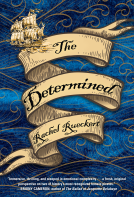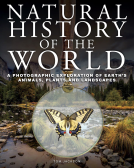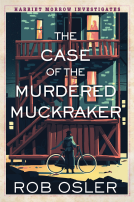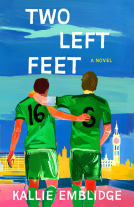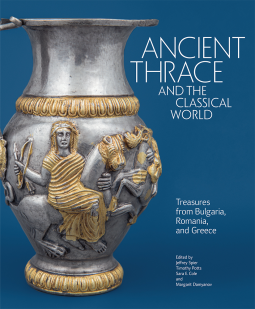
Ancient Thrace and the Classical World
Treasures from Bulgaria, Romania, and Greece
by Edited by Jeffrey Spier, Timothy Potts, Sara E. Cole, and Margarit Damyanov
This title was previously available on NetGalley and is now archived.
Send NetGalley books directly to your Kindle or Kindle app
1
To read on a Kindle or Kindle app, please add kindle@netgalley.com as an approved email address to receive files in your Amazon account. Click here for step-by-step instructions.
2
Also find your Kindle email address within your Amazon account, and enter it here.
Pub Date Jan 21 2025 | Archive Date Jan 12 2025
Getty Publications | J. Paul Getty Museum
Talking about this book? Use #AncientThraceandtheClassicalWorld #NetGalley. More hashtag tips!
Description
The Thracians—a collection of tribal peoples who inhabited territories north of ancient Greece, an area that comprises present-day Bulgaria, much of Romania, and parts of Greece and Turkey—were renowned for their skill as warriors and horsemen, as well as for their wealth in precious metals. Thracians left few written records, and knowledge of their history and customs has long been dependent on brief accounts from ancient Greek authors. They appeared in Greek myth as formidable adversaries in the Trojan War, cruel kings, and followers of the ecstatic god Dionysos. Spectacular archaeological discoveries made in Thracian lands during modern times, however, have provided firsthand evidence of this remarkable culture, illuminating Thrace’s interactions with Greece, Persia, and Rome.
Ancient Thrace and the Classical World reproduces more than two hundred glorious objects dating from the end of the Bronze Age, around 1200 BC, to the end of the first century AD, when Thrace became part of the Roman Empire. Experts explore topics such as Thracian royal tombs, the Greek colonization of the Black Sea coast, Thracian religion, and more, placing Thracian culture in a broader historical context that highlights its complex relationships with the surrounding region.
This volume is published to accompany an exhibition on view at the J. Paul Getty Museum at the Getty Villa from November 6, 2024, to March 3, 2025.
Available Editions
| EDITION | Other Format |
| ISBN | 9781606069400 |
| PRICE | $65.00 (USD) |
| PAGES | 336 |
Links
Available on NetGalley
Average rating from 7 members
Featured Reviews
 Aidan W, Bookseller
Aidan W, Bookseller
A beautiful book. The images of all the various pieces were vivid, interesting, and very well captioned and explained. The information provided, both in Thrace in general and the specific pieces in particular, was simply fascinating
If you’re into ancient history and untold stories, *Ancient Thrace and the Classical World* is a treasure trove! This book dives into the fascinating world of the Thracians—warriors, horsemen, and master metalworkers who shaped the cultures of Greece, Persia, and Rome. While they didn’t leave many written records, dazzling archaeological finds fill in the gaps, showcasing their rich and mysterious legacy. Packed with over 200 stunning artifacts and expert insights, this exploration of Thracian culture is perfect for history buffs or anyone curious about the hidden influencers of the ancient world.
After reading “Ancient Thrace and the Classical World: Treasures from Bulgaria, Romania, and Greece,” I would give almost anything to zoom back in time and conduct ethnographic fieldwork among the Thracians.
Although I’m trained as a four-field anthropologist, my research has always been biocultural with an emphasis in nineteenth-century rural African American communities. However, if I had to do it all over again, I would probably focus instead on Thracian archaeology. This book was fascinating.
Museums have always fascinated me. In fact, when I was pursuing my BA, I earned a minor in Historical Preservation focusing on archival records (there’s just something about the smell of old paper that I love), though I **almost** focused on curation. Unfortunately, it’s always seemed that life isn’t long enough for me to pursue all of my interests! Lucky for me, then, that this book included numerous chapters written by experts in Thracian archaeology and ancient history.
Before I read this book, I knew next to nothing about the Thracian tribes who inhabited Bulgaria, Romania, and parts of northern Greece and Turkey. The editors wisely included maps and a timeline alongside Roman and Greek civilizations so that I could place the events.
In addition to the expertly written chapters, this book was filled to the max with photographs of Thracian artifacts. Some of these images were really crisp and clear. Unfortunately, most of the images were heavily blurred and extremely grainy. This is a big problem for me because when I review an as-yet-unpublished book, I need to review the **entire** book. I can’t imagine that the editors would allow a hard copy version of this book to be published with blurred images, so I can only presume that: 1) NetGalley has a file size limit and the images were reduced to enable its dissemination; or, 2) the publishers have no intention of creating an e-publication for sale. Regardless, not being able to focus in on clear images of artifacts was extremely disappointing.
Overall, this book was well-written and I can’t thank the authors enough for sharing their expertise. I also personally know that it’s not easy for an editor(s) to find academic writers, edit chapters, find images, create charts, and etc. In short, I recognize that this book required an incredible amount of time and effort, so the editors deserve the accolades they’ll receive (or should receive) for this monograph. Please note that the four-star rating has absolutely nothing to do with the writing, because it is superb and will delight all educated readers. Rather, the lowered rating reflects the distorted images found in the eARC.
I received an ARC of “Ancient Thrace and the Classical World: Treasures from Bulgaria, Romania, and Greece,” edited by Jeffrey Spier, Timothy Potts, Sara E. Cole, and Margarit Damyanov from NetGalley, Getty Publications, and the J. Paul Getty Museum in exchange for an honest review. All opinions are my own.
 Kristin D, Reviewer
Kristin D, Reviewer
I would like to thank Netgalley and Getty Publications for a free copy of the book in exchange for an honest review.
This is an interesting book based on an exhibition of artefacts from Ancient Thrace and those showing the people of Ancient Thrace. The photos are beautiful and it’s interesting finding out about people who are often ignored in favour of Ancient Greece and Rome. The time lines and context help to place the culture and its influences. I also liked the discussion on the limitations of written sources, as these were often written by Greeks.
 Elizabeth R, Librarian
Elizabeth R, Librarian
Ancient Thrace and the Classical World takes a serous look at the Thracians and their connection to Greece of the classical world. from 1200 BC to the end of the ancient Greek world. Through 200 magnificent plates of Thracian art work and historical archaeological sites the Thracian tribes from the area of modern Bulgaria are brought to live in gold work and gold mines. Statues . jewelry, paintings spring to life with excellent commentary.
Wonderful catalogue.
I feel it's close to a privilege being able to read this book, the closest thing to have witnessed the exhibition.
I am very grateful to have received it in order to share my view on it. As someone living on Thracian lands, I have learned a bit of our history during school, but this book features a much larger scope and in much greater detail than our national school offered. Plus, it features discoveries that are newer, that I only got the chance to find out about before by doing some research.
It's a wonderful book to find more about the people of these lands, each chapter offers precious details in creating an image of what the Thracians were like and how they lived, with all the information available given they didn't leave behind tremendous traces. The graphics are fantastic and such a work of beauty. I can't recommend this book enough to anyone wanting to learn more about these historical people, having the best quality offered in terms of intellectual and graphical representation.
 Reviewer 725763
Reviewer 725763
Discover the rich and often overlooked history of the Thracians—fierce warriors and skilled horsemen—through stunning archaeological finds. This book explores their culture; their interactions with Greece, Persia, and Rome; and their legacy in the ancient world.
This is an interesting book with stunning illustrations. I was happy to learn more about this fascinating culture from the ancient world.
Thanks, NetGalley for the ARC I received. This is my honest and voluntary review.
Readers who liked this book also liked:
Megan Ashley Smith, LCMHC, NCC
Health, Mind & Body, Nonfiction (Adult), Self-Help

